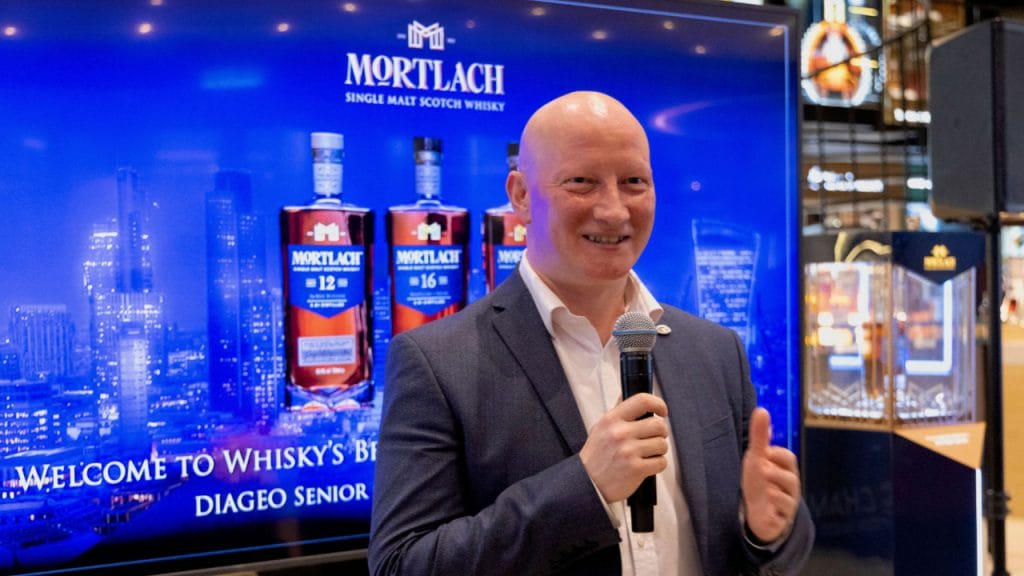Mortlach, nicknamed ‘the beast of Dufftown’, is a single malt Scotch whisky with a unique flavour. On the palate, it is big, robust and fruity, but also deeply savoury, rich almost meaty—a rare and distinct combination that has built the brand’s reputation as something that attracts connoisseurs. Behind the scenes, Mortlach’s creation process is even more unique, claiming a 2.81 distillation process that sounds incomprehensible at first.

Although other spirits such as Irish whiskey or vodka are known for being triple-distilled, double distillation is the standard in the Scotch whisky industry. After fermentation, the wash passes through the wash still and then the spirit still, in sensible linear fashion, to produce the unaged new make spirit. The typical distillery will have one spirit still for every wash still. If they have multiples of these pairs, then each spirit still will be structurally identical to each other, and so will each wash still.

Mortlach has six stills—three wash, three spirit—but they are different shapes and sizes, and are interconnected in the manner of mad science. The precise process is incredibly complicated, but Diageo Global Brand Ambassador Ewan Gunn has attempted to explain it in simplified terms. “It’s almost like having three distilleries in one,” he says. “One wash still and spirit still do a double distillation; that’s one of our spirit streams. The remaining four kind of work together to do something like a triple distillation. And they also, on a separate channel, do almost quasi-quadruple distillation; this would be the best way to describe it. Basically, those three spirit streams come together, and that is what makes the Mortlach spirit.” In a standard distillery, new still operators can be trained up in less than a year. Mortlach’s complexity means that they will only take candidates that are already experienced in the field, and even then will require up to an extra 18 months of training before they are ready.


Does this make it the industry’s most complicated to produce? “Oh yes, I think that would be very fair to say. I don’t think there’s any other spirit like it,” Gunn says. “It has incredible complexity and depth of character. But what strikes me the most is how well-integrated those flavours are—it’s really well-constructed despite having such depth.”
The person who bears the responsibility for this process is Alexander Cowie, a doctor by profession who moved back to Scotland from Hong Kong in 1897 to inherit the management of Mortlach from his father. Working with renowned distillery engineer Charles Doig (credited with designing the pagoda-style roofs that are so often found atop the kilns of distilleries all around the region), Cowie retooled the distillery and while doing so invented the unique distillation process still in use today.

Dr Jim Beveridge, the recently retired Diageo legend who is famous for his tenure as Johnnie Walker’s Master Blender, is said to have spent a significant amount of time mathematically mapping out the various fractions, percentages and ratios of this process. The number he arrived at—and had re-checked several times by experts—was 2.81. That is the number of times the Mortlach spirit is distilled.
The other thing that Mortlach is known for—or rather, not known for—is that it was something of a secret for a long time. For much of its history, Mortlach whisky was prized by blenders—it is a key component in Johnnie Walker Blue Label, for example—and single malt releases were rare. “It’s only in the past four or five years that we’ve really started to talk about it more,” Ewan Gunn says. “It’s still a bit of a secret, in some ways. It’s a whisky that connoisseurs and experts knew about, but we are introducing more people to in now.
“If I was at a bar, and I heard someone order a Mortlach, my ears prick up,” he adds. “For me, it’s an indication that someone really knows single malts, and has an appreciation for some whiskies that maybe aren’t huge global brands—whiskies for those in the know. And that’s kind of always been the case for Mortlach.”




